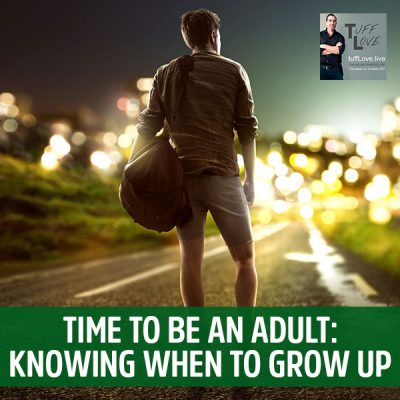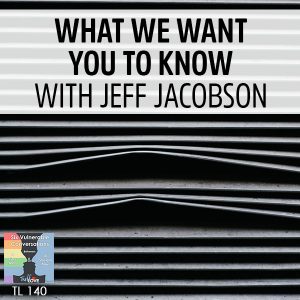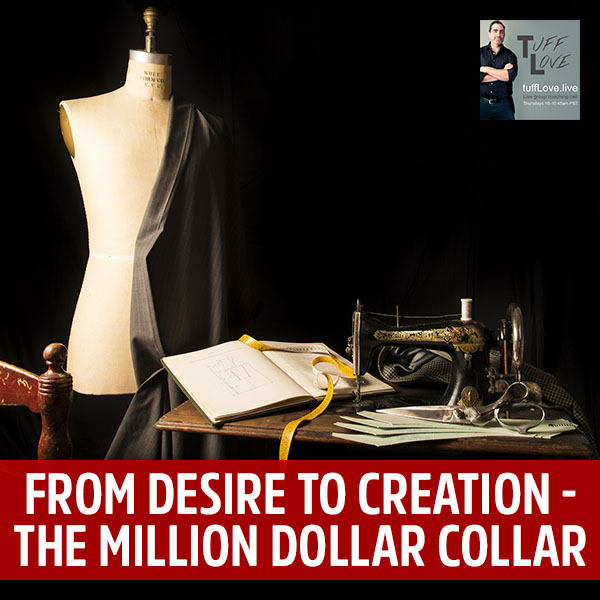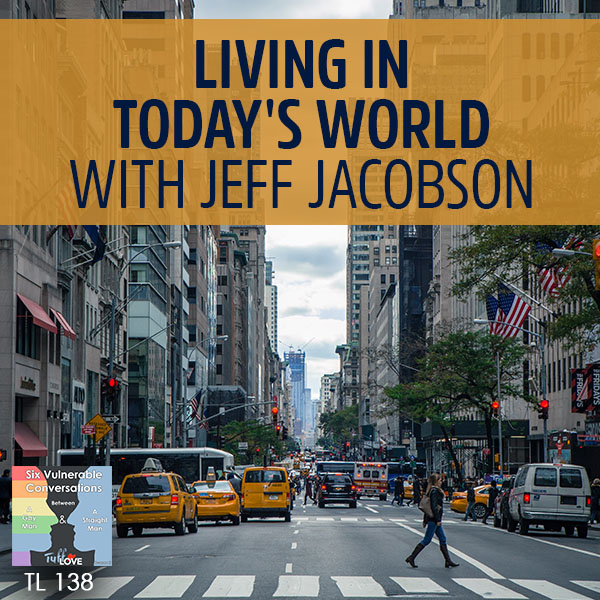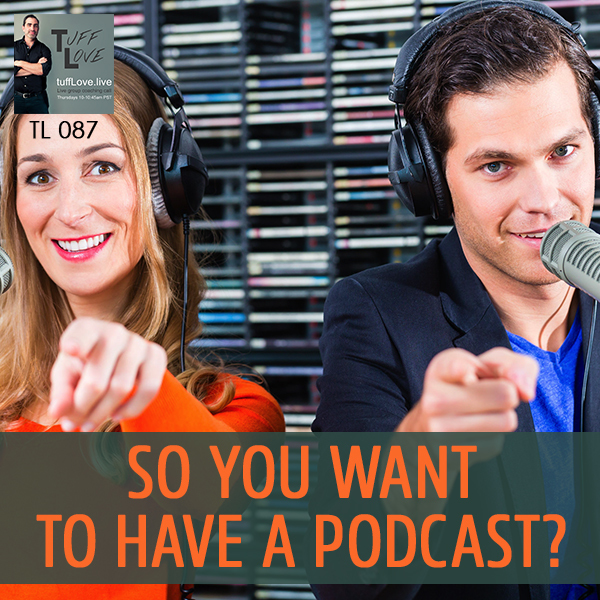
087: So You Want to Have a Podcast?
Aug 29, 2017
Perhaps you’ve never considered creating your own podcast, or maybe your hesitation stems from feelings of inadequacy and fear of exposing the vulnerability of your ideas, personality and thoughts to a large audience. Whatever the case, it’s easier to get started than you may think, and it offers a ton of benefits. This episode explores the advantages of starting a podcast and gives you some ideas about how to start doing your own, from figuring out your motivation, to working on that motivation and getting off your ass to actually do it, to setting up the technical and pragmatic points of building your podcast. Once you’re ready to record, pick a topic you’re passionate about and speak the truth around that topic to build a deeper connection and expand your audience.
087: So You Want to Have a Podcast?
I am attending Podcast Movement 2017. My first podcasting conference where I’m learning quite a bit about how this great art of podcasting and how to learn, market, and bring out different parts of myself. There’s practical advice of how you want to start a podcast and some of my stories around it. Hopefully it will give you some tips and tricks and for you to get off the fence, get on that mic and start waxing the poetic, so you can bring to the world your gifts. For more shows, please visit us at TuffLove.Live. If you like, please leave us a review on iTunes.
I’m live from Anaheim, California, where I’m attending the Podcast Movement, PM 17 Conference. My first podcast conference I’ve ever gone to. I’m having a good time. There’s an emotional issue that’s been going on with me which I think is affecting things, but all in all, it’s a pretty remarkable experience on podcasting. It’s here to provide information on the concept if you want to be a person to get a mic and start waxing the poetic and bringing your viewpoints out into the world, which I highly recommend. I was going to do a show on releasing anger or something like that, and I decided since I was coming down here to build a show around it, and I realized this show could be really boring. I mean this could be my most boring show ever, because I could be going into the technical aspects of how to build a podcast, and I think some people would definitely geek out. I also found a bunch of YouTubes and articles out there that do that.
I wanted to split this into two different things. One, I wanted to split it into the emotional motivation concept around a podcast. Then we’ll get into some nitty-gritties in the second half of the show, talking about the technical. I’ll share some experiences around my own version of podcasts and how I got here. Hopefully the show will be entertaining enough to maintain your interest. Informational enough that if you’re interested in starting a podcast, you’ll start, and then we’ll see how it goes. Worse comes to worst, it’ll suck. That is part of the podcasting world is sometimes, things suck. Hopefully not today, that’s my goal. The first thing I want to bring to the surface people know this story, but I wanted to give you my motivation for starting my podcast. I think this is the most important thing is to figure out what’s your motivation, why do you want to start it? My motivation was really clear in that I have a big brain.
I have a lot of things to say. I have a lot of concepts and viewpoints that are unique to me, and I was presenting them to the world with Facebook posts and running courses. Then I just got sick and tired of running courses. For any of you course leaders out there, know it is just a challenge to get butts in the seat. People to hand over their money, people to show up, and the whole minutia of actually running a course was just annoying me to the point where I was running courses with spectacular people, and pretty much hating the whole process. Not the teaching, always fun to be in front of a group of students waxing my poetic, but the whole process of getting butts on seats was annoying enough for me to say,” I never want to do this again.”
Then I still had all these ideas. I said, “I’ll start a podcast,” without really knowing what a podcast is. I’ve listened to podcasts for years. It’s been around since 2005. Apple started podcasts around that time, but I’ve never put any thought into creating one. I’ve done audio products in the past, so I had some audio editing skills, SKILZ but I did not really understand the depth of what it was to start a podcast. I knew I wanted to say something, so I made an agreement with myself to a six-week trial run. Put a little ad on Facebook. Sat in my house in Venice Beach, California. Wooden floors. No sound dampening. No microphone, even headset. Finnigan, the dog barking in the background. The fire truck’s going nonstop with the local Venice FD doing their work. It was pretty much a podcast disaster, because one of the main things around podcasting is quality of sound. My motivation was really just because I wanted to say something, I didn’t want to lose momentum in my life path of being of service to the world. I didn’t want to do the medium I had been doing for twelve years, which was running courses.
My motivation, my desire, was still to have a place for me to have a platform, and just to see how it goes. I didn’t really expect no many people to show up or listen. I didn’t really have a lot of high expectations in terms of the output. What happened was I got enough positive feedback from my initial crew of fans, that I had said, “Let’s do this.” Then it just kept going. People kept showing up, and then I built some groupies. I have groupies. Morgan my muse, number one muse, always there supporting me. I have Elvis and Joe, consistent listeners, the second set of live fans that show up and root me on and show up. There’s about five or six other people, seven or eight other people that show up on consistent basis, enough that I feel responsible.
I feel responsible for their 10:00 AM PST. I think that’s 7:00 PM Ireland time, whatever you guys call it over there across the pond. Just to show up. Knowing that they’re out there was enough motivation for me to keep going. Over time that motivation has grown, and especially as my reach has grown that this is what I want to do in the world is what I’m doing. That’s giving tough love. Speaking the truth around the topic. Finding that part of me and self that wants to be out there, and doing it. Because how often do we think we want to do something? “I want to write a book. I want to write eBook. I want to start a Facebook group. I want to get married. I want to have a dog. I want to have a kid,” and there’s that gap between, “I really want to do this,” and “I don’t know how to do this.” The chasm, the split between the two, puts us into a state of a freak out and being frozen. I think everyone in the world should have a podcast. That’d be a lot of podcasts, but there are a lot of podcasts. My point is I think all of us have something to say, and I think there’s this chasm between, “I think I have something to say, and I’m afraid to say it.”We sit on the fence with a fence post up our ass, feeling sensation of that wonderful sensation. We sit in that stasis and we don’t do anything. My motivation was just to remind people that they have something to say, and how to show up in the world.
It’s very okay to monetize and think about your podcast as a way to build your business. Click To TweetThe first thing about wanting to start a podcast is figuring out what’s your motivation? Your motivation could be that you want to build your business here at Podcast Movement 2017, PM 17. There’s a lot of people here who are using podcasts very successfully to build the business. I was just in a talk with four very successful people who have built their businesses, and the podcast is their lead gen. They have their process of doing a podcast. Then on the podcast, talking about a web page, and in the webpage, setting up an interview, interview leading to a course, or interview leading to private coaching. It’s very okay to monetize and think about your podcast as a way to build your business, and I think it’s a great way. It has been a great way for me. I think the success of my business has really risen as my podcast has taken speed. A lot of people come to me for coaching and business consulting because they have a flavor of me already.
Sometimes when I’m interviewing clients and clients are interviewing me, I’ll say, “Go listen to my podcast. If you like who I am, let’s do this. If you have questions and you don’t like the way I do things, then this is not a good coaching relationship. I will recommend you to someone else.”It’s been kind of a way of dating. It’s like a courting process inside the podcast, because they can really see, “That’s who I am. The second benefit of the podcast for me, part of the motivation has been my platform for a lot of things. It’s been the platform for my book. It’s given me a lot of information about how to write the book. It’s been a source of material for my marketing, in terms of taking the Zoom live and turning them into videos. Some of those videos, one video in particular, I did is Why I don’t Teach Men to Touch Anymore, was my most successful Facebook video with about 15,000 views, and my mailing list and everything went up after that. There’s a way to leverage.
When you do a podcast, you’re creating content, and we’re in a content hungry world. We live on Facebook. We’re always looking for that article. We’re always looking for the seven tips to get laid. The seven tips not to kill your partner. Wherever those things are, we are always looking for content. One guy said I could spend four hours writing a blog, or I could do the same thing in fifteen minutes on a podcast. Then take the podcast and transcribe it, and then write the blog from that, which is something I do as well. For me podcast is a really a powerful thing to get the stuff out of our brain into the world. Number three motivation for me is it scratches an itch. I saw a movie when I was a kid, Christian Slater, it’s called Talk Radio. Millennials might not know it, but all the people grew up in the ‘70s and ‘80s, there was an incredible movie where Christian Slater played a Jack Nicholson type.
He talked into a radio and call all this ruckus, because he had a platform to speak his truth, which he really enjoyed. It’s really important to find what your motivation is for the show because if you’re looking for motivation for people to listen to your show, every single podcaster I’ve talked to said, “There’s almost always a long lead time between starting your podcast and having listeners.” I saw 300 downloads a month, ten per day, for a long time. I saw 500. I saw 600. I saw 800. I hit 1,000 downloads a month, and then it went much quicker after that to the point now where I’m at 8,000 downloads a month, but that’s an eighteen-month gap. That was a twenty-month gap of Elvis, Joe, my mom, my other biggest fan who listens to every single show and here’s every secret in my life on the podcast. Be careful your mother who will listen and know all your secrets when you do a podcast, but my mom is another big fan.
The point is that it took a long time from that, starting the podcast. If you’re in this for the short game, I don’t think this is the right game for you. If you’re in for the long game, to have the space to expand, grow, and mature, I think this is a really important piece. Also I’m really glad that not a lot of people listen to my earlier shows, because in comparison the sound quality was awful, my maturity around it was pretty bad, and I’ve definitely grown up inside the process of podcasting. Just know that it is a long game. I’m going to tell you about the first thing that doesn’t work around my show. This is a really good example of who I am..I don’t quite have a niche for my show, and that’s confusing. I was talking with a marketing friend the other day, and he says, “I don’t know how to describe Tuff Love. How would you describe it?”I went through my usual speed of, “It’s a 40-minute experience, twenty-minute rant, twenty-minute live coaching, and we cover topics.” He’s like, “What kinds of topics?” I’m like, “Relationships, communication, sexuality, business, life purpose, tools and tricks, and communicate.” He’s like, “Can you see how many different topics you have?”I’m like, “Yeah, I got a lot of topics.” He’s like, “Do you see how that’s somewhat confusing?” I’m like, “Yeah, I can see how that’s confusing.” What I’m getting in the conference, you go places to try to learn things. The inspiration is I need to create a more secure niche, so I can actually spread my podcast well. Because I’m in this place of a huge expansion, I don’t really have a way to pull in listeners that really work. I need to get down to more of a niche.
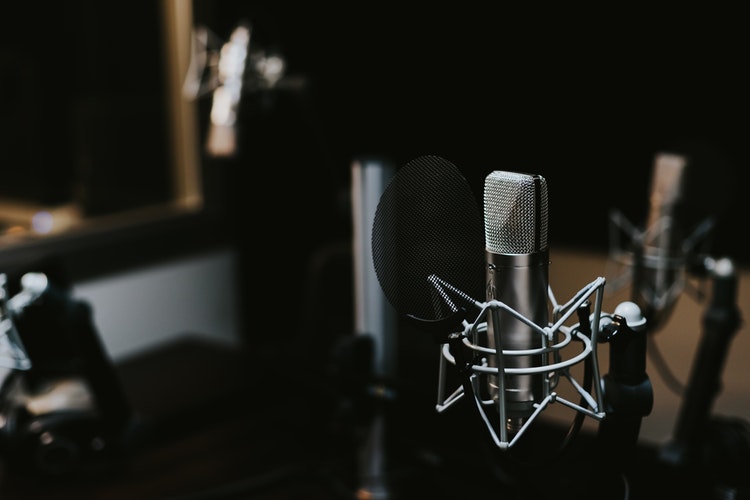
Podcast: The first advice if you want to find your podcast is to create a niche.
One guy was, “You could just be communication of how women should talk to men.” My little inside was, “No, I don’t want to be put it into one little bucket. I have so many things to say. I have so many things to talk about.” It’s an issue. It’s a challenge for me at the moment. The first advice if you want to find your podcast is to create a niche. That’s my problem is I have so much to say on so many topics, so I’m not saying I know what to do about this, but this is my next hurdle to do is to find out how to best present this, so people can eat the podcast and know what they’re eating clearly. Again, a mystery. One guy is, I saw podcast, he has 12 million downloads or something ridiculous. His podcast is about how to build a membership-based website. He answers one question a podcast, and there’s one podcast a week. He just does one thing. His focus is so narrow focus, but that guy is making bucks, using the podcast to sell his memberships on how to build a membership site. Again, you have to look at your motivation. I don’t think I have Tuff Love as a way to make money. I’m not here for the dollars. Thank God, my life coaching and business consulting makes enough. At the same time I would like to make a little cash on the podcast, and I would actually like to spread it. It’s a balance between the two to look at your motivations.
Let’s get to some pragmatic points of how to build the podcast. Here are some high level things. The first thing is you need a way to record your podcast. What’s a podcast? It’s an audio recording. It’s an MP3 file or M4A file. It’s a file that you actually want to upload to the server, to the web, that people can listen to it. You need a way to record it. The most important thing is the microphone. If you want to start a podcast, it’s best to invest in a microphone. When I started an Audio-Technica AT4040, I think it was about $200.There’s two ways to speak into a microphone. There’s like directly on, like I’m doing right now. Then there’s the side register. The Audio-Technica was aside registered for about a year and a half until my friend Bob said, “Hey, you’re talking at the wrong end of the microphone.”When you buy your microphone, ask, “Do I talk here? Do you talk here?” It’s okay not to know which end of a microphone to speak to. Just ask, but invest in a microphone. That is the most important piece, because it’ll diminish your reach of your podcast if the sound sucks.
When I started, I was in a really loud room, without a microphone, and so the quality is bad, and so over the time buying the microphone. I started off with the Audio-Technica. I bought the Shure SM7B because I was jealous of my friend, Trip’s sound. I said, “Trip, how’d you get that groovy sound, baby?” He said, “It’s a Shure SM7B.” This is a $400 microphone. There’s other ones out there that I’m doing some research. There’s a Hillsound, there’s a Blue Yeti, very popular. There’s many mics out there. You can do the research and there’s plenty of articles on how to do it. I love my new microphone because the crispiness of the sound. I also found with this microphone, it’s important that you need to make out with a microphone and being very intimate. I hope Morgan doesn’t get jealous. I mean very intimate with my microphone because my lips are very close to the tip. Find out how to use your microphone to the best, and just make out with your microphone. Get intimate. Get down with your microphone.
Then you need a way to attach your microphone to your recording device. You can get an external recorder. The Zoom recorder is, one of the best ones out there. You can go directly to your computer. It means you need a cable to go from your microphone to your recorder. The cable is called an XLR cable. If you want to connect to your computer, you need a connector. You need a connector between the XLR cable to your computer, and that’s called an XLR to USB connector. It’s a way to take the XLR into your laptop. The one I started off with was called Blue Icicle. Very inexpensive worked great. With my upgrade to the Shure SM7B, I bought the M-Audio M-Track 2×2which is a cool looking device with lots of knobs and little lights that I feel like I’m super cool, getting down with my M-Audio M-Track 2×2.
There’s many configurations out there. You can figure out your budget, but I would recommend getting a cheaper adapter if you get a more expensive microphone. It’s all about the mic. Once you have that, you need a way to record. You can get an external recorder. My format for running a show is I use Zoom, because I am a crazy podcaster. I found out I’m a very unique brand of doing a live show. There’s not a lot people out there doing live podcast. Most people sit in front of their computer and speak into the mic, and then edit, and they edit a lot. I’m one of those rare people that likes to do things live, because I like to see Elvis and Joe’s smile, and Morgan’s eyes cringing when I say something chargey. I like to see people’s reactions, that inspires me. Other people like to record. I use Zoom to one, transmit the show out to the world so people can log on and listen. It also records the video and the audio for future use. I do my show for 40 minutes, it saves those files locally to my computer. I then bring it into an audio editing software. There are many out there. I use GarageBand because it’s free, and I’ve been using it for awhile. Audacity is another one that’s free and old school. There’s a few Adobe products that are great. You can find many audio editors out there.
I then steal music. I did get a card from how to get good podcast music for free. That’s legal. What I do is I actually like taking modern songs and putting them into my show. What I do is I go to YouTube, I look up karaoke, Miley Cyrus, whatever the name of song is. I find the karaoke version. Because what’s karaoke? You’re at the karaoke bar, the music plays, and the words presents, but there’s no lyrics. You’re the one singing. I like the track of the music because the music actually evokes an emotion. I love using music in the beginning of the show to evoke familiarity and emotion. That’s why I’m really hesitant to go to these free audio files out there, because it won’t spark an emotion. I then download. There are websites where you can go YouTube to MP3. I put in the URL and then I download the karaoke song as an MP3 file. I bring it into Garage Band.
I have my raw audio file from the show. Before and after each show, I do a little talk. “Hi, this is Rob Kandell. Welcome to Tuff Love.” It’s called a bumper. I do the initial show of describing, and it’s usually like, “This was great,” or, “This was screwed up,” or, “This guest wowed me,” and I give the person introduction so they know what they’re getting themselves into. I start the music, cue Miley. I bring in the bumper, “Hi. Welcome to Tuff Love. This is about the show.”Then, “Now we’ll join the show in progress.” I fade out the bumper. Miley keeps playing. Then the show, “Greetings and salutations. Welcome to Tuff Love,” goes on to the show. Then I fade Miley and then I do the show. I put a bumper at the end with more music, and then export from GarageBand into an MP3 file.
This is where you can get really creative, because there’s no rules around this, and I’ve been listening to more podcasts recently. There’s actually one that’s knocking my socks off. It’s called The Butterfly Effect and the effect of free porn in the world. If you want it, it’s free on Audible if you want to check out something really amazing. It’s an amazing story, the guy is brilliant, and the show is awesome. I’ve been listening to the sound quality and it’s a very different type of podcast. This podcast is more about reporting. It’s more about talking. The Butterfly Effect and This American Life are more story based, and much more challenging to do because they go in the research, they interview, they edit heavily, and they instill music.
The point is I like that they used music to bring up emotions in the middle of the podcast. It wouldn’t quite work with Tuff Love because it would lose it, but you can do anything you want with that. You can bring in sound effects, you could have your mom talk about the effect, you can do whatever you want. It’s neat because you can get really creative. I do recommend that if you want to start doing a podcast, you start thinking outside the box, and you start thinking about what would be really fun for you. The way I do my show is really fun for me. My editing process is rather quick and could have gotten good at it, but it’s really fun to go find that song that seems to fit, or something that’s really good, and then to produce the show the way I want to. Think outside the box. Think about what you want to do. That’s a really important piece.
Think outside the box. Think about what you want to do. That’s a really important piece. Click To TweetNow I have my MP3 file. There’s many things you can do with this MP3 file. The next thing you can do is you can upload it to a service that will host your podcast. You can even upload it to your website. Most websites, when you host your site, you can actually link a file to your website. I did this for a long time. It’s free, it’s just like you’re uploading up image to put on your website. You can upload an MP3 file. The challenge of this is your web hosting service does not have the right technology to stream a lot of people. You can get fragged, it can get stuck. If you have one or two or five or ten people, listen to the podcast at the same time, they’ll be fine. Which I was doing in the beginning, when I was getting those 300 downloads a month. If you have 200 or 500, someone’s going to lose out. That is the worst thing possible for your users to not get what they want because people are instant gratification people. We want what we want right now. If they try to download your podcasts and they can’t, then they get pissed off and say, “Fuck you, Rob Kandell. I don’t care how much you liked Miley. We’re out of here.”
I invested in a web hosting service. Libsyn, is one of the best. I use Blubrry.com. These are great sites where I can upload my MP3 files, and they host it. They’re designed to handle thousands and thousands and thousands of downloads. You upload your file to a place where it’s accessible on the web. You can also use SoundCloud. SoundCloud is a very popular way for people are uploading their podcasts. I thought about doing SoundCloud, but I wanted to be on iTunes. I didn’t want to have to do two uploads. What I do is I use a WordPress plug in called PowerPress. What PowerPress does, it’s a Blubrry product, you can put on your own website, in TuffLove.Live, there’s a link, you can play it. Also it pushes it automatically to iTunes and Stitcher. What it is, it actually takes the link, it puts it out and then it puts it on iTunes. It doesn’t copy the file. The file just exists in one place, but the access, the marketing, the spreading, and this is really important because iTunes is by far the most popular place that people consume podcasts. You want to be able to push it to iTunes very easily. This really cool plug in, PowerPress does all the work for you. I highly recommend that. You’ve recorded, you’ve uploaded, you presented, and then you have your podcast, and you’re like the new store, the new kid on the block waiting for people to come by, and then how do you market? Well, this is not my area of expertise. I’m still learning how to do this, though I have grown at 8,000 downloads a month.
The way to market, the main thing to do is to be consistent. To be consistent means you do it every week. I record, I do my live show every Thursday, I then publish on Monday. Some days I’m a day late, but I’m always publishing on Monday. People can learn to expect, they know on their little iPhone app my podcast popping up in their podcast app. Be consistent, even if it’s once a month. Do it once a month, rather than once in July, once in August, and then three in September. Be consistent. It’s the best way to build your audiences consistency and I’ve heard that many times during this show. Then use your social media marketing. I leveraged Facebook quite a bit to get downloads. I also use Twitter, I use Instagram, I use my tools. I’m not an expert at this, but I have grown because I’ve consistently gotten subscribers to iTunes. The best way to get downloads is so much as subscribe, so every time you publish a show, they do a download, and then you have people going free to their phone or their device. Having subscribers on iTunes is really powerful. Let me go to a few questions I got on Facebook as I advertised this show.
Here’s some questions. Kim asked, “What’s the best mic?” I think I talked about that, so far I’m really enjoying the clean, crisp sound of the Shure SM7B. That’s my favorite. Publishing through iTunes, I think I talked about that is you want to create a website and then push a copy to definitely do iTunes. David asked, “Picking a topic and possibly changing course after starting.” You want to figure out what your niche is, and you want to think about what your topic is. Tuff Love has been pretty consistent in its approach of basically having a rant and then doing live coaching at the end. About a month or two in, I started having guest stars on, and so they could coach with me and present their ideas. It was easy because what I did is I didn’t have to think about topic after topic, and I loved having people come on and bring their other ideas.
Guests are really great. Also, guests will promote hopefully to their audience, and then you get more exposure by them presenting. Guests are one of the coolest things. There are many shows that are just guest orientated and all the podcast person does his interview the guest, and it’s a great way to do it. I like having the mixed of both me just ranting and having an experience, and also bringing really smart people on the show. Think about a topic and I saw this one when a person that said, “You think all the podcast topics have been taken? Nope, it’s not true. If you have something that you truly love and want to present on, do it, and people will come, or the right people come.
Another person at the show said, “You think you’re only getting 100 downloads and that sucks, but think about those hundred people you’re serving. Think about the difference you’re making in their lives. Would you rather not do a podcast because you’re not getting the 200 downloads? Or would you rather do the podcast knowing you’re helping 50 to a hundred people a month? 150, 200, 300 people a month. Just think about that. What’s your motivation? What’s your idea again is to figure out why you’re doing it.”For me, making Elvis and Joe’s life better, that is enough. That’s enough on some level. It just feels good to know that I’ve impacted them and they’ve been fond enough to come in and say like, “You’ve affected this.” Steven’s real quiet every week, but I know he’s absorbing things. My mom, I’m helping my mom with her life, and how cool is that to give back to my mom through my podcast. Sometimes she’s not so happy about the things I say, especially talking about the early family dynamics. At the same time she’s grateful to know that she knows this about me. Just think about the impact you have.
Pick something you truly love. If you start talking about something you’re not totally into because you think it’s cool or you think it’s going to get traction, people will not listen, and they will tell that you’re a poser. They will tell that you’re phoning. It comes across with your passion. My passion in this show week after week because I’m passionate. Some weeks I’m a little down or a little not enthusiastic, and sometimes topics and sometimes guests, and sometimes coachees don’t quite work, but at the same time they can feel my desire. Pick a topic that you’re truly passionate about. Find something that really turns you on, and change course after starting. Continue to work on your branding. You are going to evolve through your podcast and allow yourself to evolve with it. Find what you want to do, and I know I have to work on this with your niche, keep focusing on what really turns you on. It’s okay to start really broad and then narrow, and then expand a little bit. You find out how to do it.
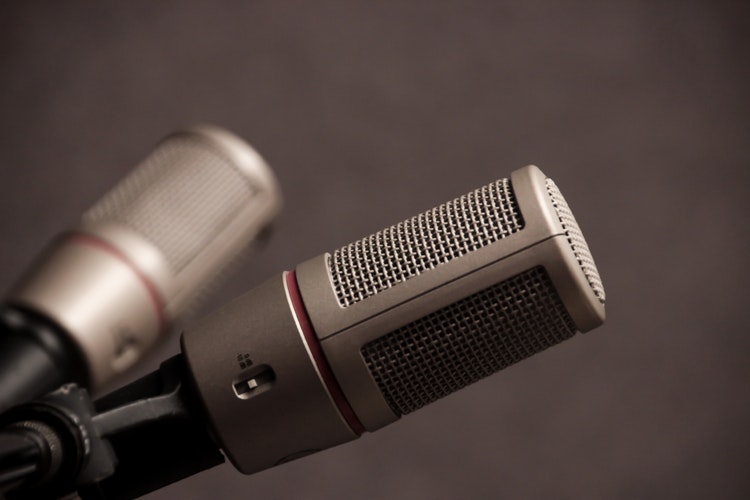
Podcast: Continue to work on your branding. You are going to evolve through your podcast and allow yourself to evolve with it.
Another question is, “What’s the best platform to create it on?”My personal is to use Zoom. You can use any recorder, external or external to your computer. You can record directly to GarageBand, I’ve seen people do that. There’s so many options out there, just as long as you have a solid mic and a recording device that records it well. “What is the bare minimum branding, et cetera, that we require to get started?” What I did is I first started just with the name, and the name came to me when I left OneTasteand I was starting off, and figuring out who I was and Tuff Love just came across. The first thing is to come up with a name that works. It could be the Happy Podcast, it could be the Podcast on Knitting, the Knitting Podcast, I’m sure there’s several around that. You can come up with all different, and you want it slightly unique. I researched Tuff Love, and I found out no Tuff Love. There’s a few things out there. There’s a BDSM shop called Tuff Love in the Midwest that I must visit someday and get a t-shirt from. There’s a band called Tuff Love, and Tuff Luv. Find out what your topic is and do some research, and ensure that it’s not being used for another podcast. Because you can actually get in trouble if you use the same name as another podcast. It’s very easy to search today with Google. Just put the name or what you want to do and the podcast.
Then I had my designer friend make a logo. If you go to Fiverr.com, there are so many artists out there and there’s so many people out there willing to make you art on the cheap. You get what you paid for. There really is some quality stuff out there Fiverr. I would definitely check out Fiverr.com. I start off with a logo, and then over time I’ve just expanded my branding. I pay my friend, Andrea to help me build my banners that show up on Facebook every week. I had her build a one-pager that I’m carrying around the conference. Basically it’s a way for me to spread the show. You can just keep working your branding. The main thing I would do is figure out your name, get a logo, and start there. I think that’s your minimum. Then the last question I had on the Facebook was, “How do you structure when you talk on your own and when you have guests?” I decided to do guests on the second and last Thursday of every month. Sometimes there’s five Thursdays in a month, I’ll do on the last Thursday.
The other weeks is I do my own show. It’s up to you. You can be creative. You can have whatever you want. Listen to other podcasts, steal ideas, get inspired. You don’t have do this all in a vacuum. You can actually go and look at what you like, what turns you on, listen to podcasts. Some podcasts, I just found out, we’re like five or six hours. A Hardcore History, the keynote, is a five to six hour podcast on history. I was like, “Oh my God,” obviously you’re probably not going to sit that in one sitting, or maybe when you’re driving in California. There’s different lengths. Some podcasts are ten or fifteen minutes. I had been a guest on podcasts that are ten minutes and it is like the shortest sex ever. It’s like just when you’re warming up, it’s done. There’s many options out there. I would recommend people going shorter rather than longer, just people will look at the length of your podcast and make a decision to stay or not. There’s podcasts out there that are three hours, very popular out there. So you can just find out what really works for you and go with it.
It’s been an interesting show. It’s really flowed very easily, so I’m grateful for that. A few more things is, reviews on iTunes is really important. I’m always begging my listeners to go to iTunes and just leave me a review, because it helps. It increases the visibility of your show. When you first launch your podcast, if you get a lot of reviews and a lot of ratings, you can go to New and Noteworthy I think it’s called, and be put on the top of their list, so I recommend it as well. If you do want to launch a podcast, just make a big splash and see what happens. There’s also books out there, I’ve read a few of them. None of them have really inspired me that well. They’ve all helped a little bit. In summary of the show, first thing is the motivation.
Figure out why you want to do this. The second is get off your ass and do it. Just plug your microphone, borrow a microphone from a friend, or even plug your headphones into your computer and just do it. If you want to be crazy like me, do it live. If not, you can record it. If you hate it, you can delete it or you can take parts of it. You can edit in post-production. That’s the beauty of normal people as they can edit in post-production. Crazy people like me just do it live. I can edit my mistakes in post-production before I upload it, it’s just the live show where I can totally embarrass myself. My point is you can find the balance between the two. Motivation, branding, come up with the name, buy a good microphone, get off your ass and do it, and then it’s just start. Be consistent, fall in love with it, get addicted like me, and go from there.
That is my rant on how to have your podcast. Hopefully of value to you. Thank you so much for my audience. Go forth, find out what your message is. Thank you so much as always for listening. I’m grateful. Have a great day.
Thank you so much for joining us for Tuff Love around how to start your own podcast. I enjoyed the show, enjoyed the flow, and hopefully it will give you some ideas about how to take it to the next level. For more shows, again, please visit us at TuffLove.Live. Check us out on iTunes, give us a review, give us some stars. Thank you so much as always for listening. Have a great day.
Resources mentioned:
-
- Podcast Movement
- Why I don’t Teach Men to Touch Anymore
- Audio-Technica AT4040
- Shure SM7B
- Hillsound
- Blue Yeti
- Blue Icicle
- M-Audio M-Track 2×2
- GarageBand
- Audacity
- The Butterfly Effect
- This American Life
- Libsyn
- Blubrry.com
- SoundCloud
- PowerPress
- Stitcher
- Rob Kandell’s Facebook
- Rob Kandell’s Twitter
- Rob Kandell’s Instagram
- OneTaste
- Fiverr.com
- Hardcore History
- iTunes
Podcast: Play in new window | Download




